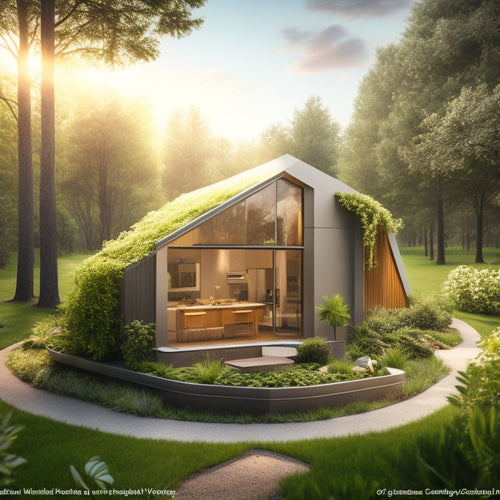
5 Tips: Mini PCs for Energy-Conscious Home Offices
Share
When setting up an energy-conscious home office, you'll want to prioritize components that reduce energy consumption and heat generation. Opt for low-power processors with low thermal design power ratings, and pair them with energy-efficient RAM featuring lower voltage ratings. A low-wattage power supply, such as a 40-60W PSU, will also help minimize energy consumption. Consider fanless mini PC designs that incorporate innovative heat dissipation for silent operation, and look for Energy Star certification to guarantee compliance with environmental standards. By choosing the right components, you'll not only reduce your energy bills but also create a more sustainable workspace - and there's more to investigate when it comes to optimizing your mini PC for maximum energy efficiency.
Key Takeaways
- Opt for low-power processors with low TDP ratings to reduce energy consumption and heat generation.
- Select energy-efficient RAM with lower voltage ratings (1.2V or 1.35V) to minimize power consumption without performance loss.
- Choose a low-wattage power supply (40-60W) with high efficiency ratings (80 PLUS Bronze/Silver/Gold) to reduce energy consumption and electricity bills.
- Consider fanless mini PC designs that incorporate innovative heat dissipation for silent operation and increased reliability.
- Look for Energy Star certified mini PCs that consume less energy, lower utility bills, and enhance property value.
Opt for Low-Power Processors
When setting up an energy-conscious home office, you frequently find yourself juggling performance and power consumption. To strike a balance, consider opting for low-power processors.
These processors not only reduce energy consumption but also generate less heat, minimizing the need for cooling systems. Look for processors with low thermal design power (TDP) ratings, as they'll consume less energy while maintaining decent processor performance.
Additionally, optimizing your solar panel array design, such as strategic orientation, can also lead to increased energy efficiency. By doing so, you can also reduce energy waste and minimize your carbon footprint.
When comparing options, factor in the cost comparison of different processors. While low-power processors might be more expensive upfront, they can lead to significant long-term savings on your energy bills.
Choose Energy-Efficient RAM
Since you've selected a low-power processor, it's essential to complement it with energy-efficient RAM to maintain a power-conscious home office setup. This guarantees your mini PC consumes minimal power without sacrificing performance.
When choosing RAM, consider the following factors:
Opting for solar-powered systems can lead to potential annual savings of $500 to $2,000+, making it an attractive option for energy-conscious users. Additionally, utilizing renewable energy can lead to potential tax credits, grants, and the opportunity to trade carbon credits, increasing revenue opportunities.
- Check the voltage: Opt for RAM with a lower voltage rating (1.2V or 1.35V) to reduce power consumption.
- Performance comparison: Confirm the RAM's speed and latency align with your processor's capabilities to avoid bottlenecks.
- Compatibility factors: Verify the RAM is compatible with your mini PC's motherboard and processor.
- Capacity: Balance your RAM capacity with your workload requirements to avoid unnecessary power consumption.
Select a Low-Wattage Power Supply
You've taken the first step towards an energy-conscious home office by choosing energy-efficient RAM.
Now, it's time to focus on the power supply unit (PSU). A low-wattage PSU is crucial to reduce energy consumption, especially considering how solar-powered charging solutions can greatly lower carbon emissions.
Look for power supply types with high efficiency ratings, such as 80 PLUS Bronze, Silver, or Gold certification, which guarantee the PSU wastes less energy as heat.
When selecting a PSU, consider the wattage ratings required by your mini PC's components. A general rule of thumb is to choose a PSU with a wattage rating 10-20% higher than the total power draw of your system.
For most mini PCs, a 40-60W PSU is sufficient. By choosing a low-wattage PSU, you'll reduce your energy consumption and lower your electricity bill.
Consider Fanless Mini PC Designs
Silently running in the background, your mini PC's fans can consume a significant amount of power and generate noise. To minimize energy consumption and noise pollution, consider fanless mini PC designs.
These designs often incorporate innovative heat dissipation solutions, allowing for silent operation without compromising performance. Additionally, they can be powered by renewable energy sources like solar and wind, which can reduce carbon footprint and support sustainable energy infrastructure Renewable Energy Sources.
Some benefits of fanless mini PCs include:
- Compact form factors that fit perfectly in small spaces
- Reduced power consumption, resulting in lower energy bills
- Increased reliability, as there are fewer moving parts to fail
- Improved durability, as they're less prone to dust buildup and overheating
Look for Energy Star Certification
When shopping for a mini PC, you'll want to look for energy efficiency beyond just fanless designs. One way to ascertain your mini PC is energy-conscious is to look for Energy Star certification, which is similar to how businesses can reduce their energy consumption impact by generating their own electricity through renewable energy features.
This not only lowers their energy bills but also increases their property value. This certification, awarded by the U.S. Environmental Protection Agency, indicates that the device meets energy efficiency standards set by the agency.
Energy Star certified mini PCs consume less energy, reducing your energy consumption and lower your utility bills. Additionally, these devices often use sustainable materials, minimizing their environmental impact.
Frequently Asked Questions
Can Mini PCS Support Multiple Monitors for Multitasking?
You can definitely set up multi-monitor setups with mini PCs, elevating your productivity with enhanced screen real estate, and you'll appreciate the resulting productivity enhancements that come with easily referencing multiple apps and files simultaneously.
Do Energy-Efficient Mini PCS Compromise on Performance?
You'll be surprised to know that 70% of mini PCs now meet mainstream performance benchmarks, and you're wondering if energy-efficient models compromise on performance - rest assured, they don't, offering impressive energy savings without sacrificing speed or functionality.
Are Mini PCS Suitable for Resource-Intensive Tasks Like Video Editing?
You're wondering if mini PCs can handle resource-intensive tasks like video editing, right? Well, they can, but you'll need a high-end model with a dedicated GPU for decent video rendering and gaming performance.
Can I Upgrade the Storage Capacity of a Mini Pc?
You're not trapped in a storage squeeze! You can breathe easy, upgrading your mini PC's capacity is a breeze, with various options like SSDs, HDDs, or hybrid SSHDs, giving you the freedom to expand and tailor your storage to your needs.
Are Mini PCS Compatible With All Operating Systems?
You'll find that mini PCs are generally compatible with most operating systems, but you'll want to check the manufacturer's specs to guarantee support for your preferred OS, whether it's Windows, macOS, Linux, or Chrome OS.
Related Posts
-

Why Vertical Gardens Reduce Home Energy Consumption
By incorporating a vertical garden into your home design, you'll reduce energy consumption through natural insulation...
-

Why Transform Human Waste Into Garden Gold?
By changing human waste into garden gold, you'll reduce waste management costs, support sustainable agriculture, and ...
-

10 Best Sustainable Waste Management Solutions for Green Homes
You're likely unaware that the average green home generates over 2 kilograms of waste daily, but with the right susta...


